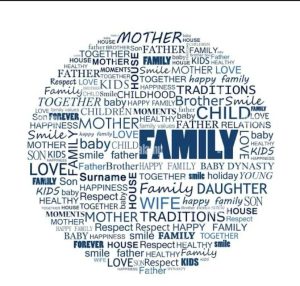By: Rosheedah Adedamola

Family is often considered as society’s oldest and most significant social institution. Its responsibilities encompass offering guidance, and support, and fostering a sense of belonging among its members.
Traditionally, within the framework of the traditional family, children learn the values of discipline, hard work, respect for elders, and constituted authority, responsibility, integrity, and credibility.
Indeed, a strong family foundation is a key to fostering a good and healthy society which in turn contributes to the stability and prosperity of a nation. However, with the advent of modernity and industrialization, the traditional role of the family has diminished significantly.
Many parents overwhelmed by work commitments have had less time for their children and seem to have delegated most of their responsibilities to nannies and house help due to work commitments have increasingly relied on nannies and house help to fulfill their responsibility towards their children.
The result has been an increase in juvenile delinquency, elevated levels of criminality activities, widespread drug abuse and addiction, high rate of promiscuity, disrespect towards elders and constituted authority, the prevalence of “get-rich-quick” mentality rich quick syndrome, disregard for the value of hard work, rampant corruption and a lack of responsibility, integrity, and credibility.
To restore societal balance and family values before they derail completely, we must prioritize the preservation and promotion of cherished family values. In Nigeria, these include integrity, the honor of the family name, unity, mutual respect, reference for human life, nurturing of children, committing to marriage, upholding sexual chastity, and dedication to hard work. In contemporary times, some of these values have been altered by modernization. However, changing family values is not peculiar to Nigeria.
A survey on attitudes to family life in the UK and Europe (2021) confirmed that family values have changed between 2006/2007 and 2018/2019. The report indicates that attitudes towards family life changed from being conservative to becoming postmodern within the said time.
The study further revealed that younger generations are more inclined towards liberal family values.
Dzintra and Marite (2015), however, argued that the adoption of family values by children and youths should be based on voluntary acceptance, appreciation, and adoption of such values as theirs. adding that youths can comply and be self-regulated when they voluntarily embrace and internalize certain values.
According to Knafo and Schwartz (2009), acceptance or rejection of parental or family values is an important part of socialization; therefore, parents should be flexible in their demands, recognizing that encouraging children’s unique perspectives gives them more leeway to pursue their interests and live by their own set of values because personal values shape one’s views and actions, Soenens et al (2007).
Why is family important? While everyone is born to a mom and dad, not everyone is born into a loving family. The lack of strong, loving families can lead to the downfall of modern society in so many ways. Being part of a family, or not being part of one, has a trickle-down effect on the decisions and actions we make.
Those decisions and actions can eventually lead to problems in society if too many people are making poor choices that don’t benefit the group as a whole.
Why are families important to individuals and society? The role of the family in society is to establish in children a sense of belonging. This helps them learn to interact and work together for the betterment of all. With this foundation of caring for themselves and others, families are also responsible for educating children and instilling family values. This creates citizens who are eager to work hard to reach goals in civic ways.
Family values are a necessity for the improvement of society’s development because a good family guarantees a good society and a good society guarantees a good and stable nation.
By instilling societal norms, morals, and ethics, families contribute to societal stability. The values and discipline taught in families reflect in the behavior of individuals in society, maintaining social order. In essence, family values are fundamental building blocks of society.
A large and established body of research has shown the significance of family values as a major instrument for carrying out essential production, consumption, reproduction, and accumulation functions that are associated with the social and economic empowerment of society.
Within families, individuals form their identities, cultural heritage, family values, and societal roles all contribute to self-perception and self-esteem. A positive family environment helps individuals to develop a strong sense of self, which they carry into their broader societal interactions.
Every social institution involved with education, work, economics, culture, and politics is connected with the family. It is in the family that one first becomes aware of his or her dignity and learns what it means to love and be loved, and what it means to be a person in society.
Quoting Andas Anderson and Taylor (2006), family values are in a constant state of change, particularly as new social conditions arise and as people in families adapt to the changed conditions of their lives.
Furthermore, once the family has done great work on impacting positive family values in their children, there is an absolute certainty that this positive value would be transferred in enhancing the development of society.
In conclusion, the values instilled by the family form the bedrock of a child’s learning, development, and interactions with the world. These beliefs, shape a child’s lifestyle and evolution into a contributing member of a society. Upholding these values and morals serves as a guiding compass for individuals in their daily actions.
